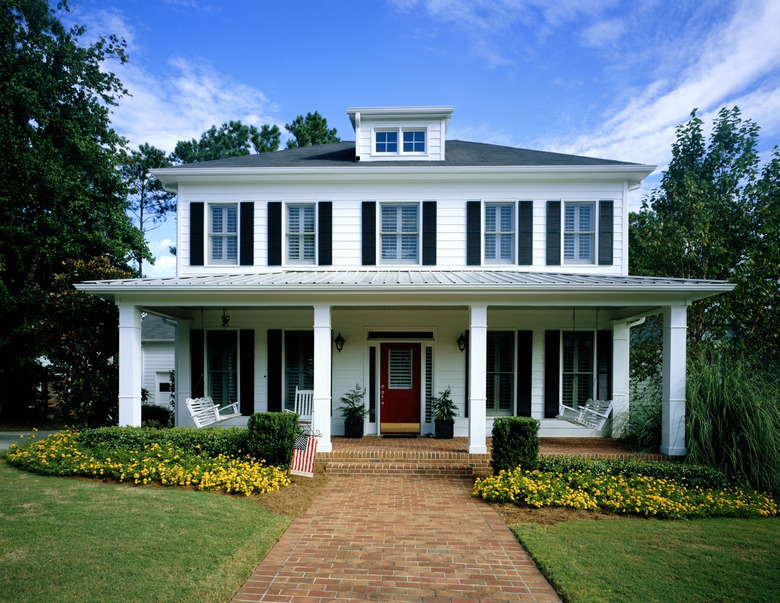What Is An Adjustable-Rate Mortgage? (And Is It A Good Idea?)
With interest rates on the rise, many homeowners and hopeful homebuyers are looking for alternative ways to lower their costs. Enter the adjustable-rate mortgage, or ARM. ARMs are known for their lower introductory rate, making them a great option for those who are looking to save a few bucks up front or people who may need a lower monthly payment to qualify for a mortgage in the first place. All of these benefits may have some people asking if ARMs are too good to be true. According to the experts we spoke with, that all depends on exactly what you intend to do with your home down the line.
What Is an Adjustable-Rate Mortgage?
An adjustable-rate mortgage is a mortgage with an interest rate that adjusts after a certain period of time, according to Michael J. Franco, a broker with Compass. ARMs often come with an initial interest rate that's locked in for five, seven, or 10 years. However, he notes that sometimes you can get lower upfront locked-in pricing that often comes with an even more favorable price where your rate is set for as little as one to three years.
As the name suggests, these rates can continue to change, explains Mihal Gartenberg, an agent with Coldwell Banker Warburg. "For example, for a 5/1 adjustable-rate mortgage, the borrower would pay the same amount for five years, and the interest rate would reset according to market value every year thereafter," she says. "A 5/6 adjustable-rate mortgage would readjust every six months."
Normally, your adjustment period will have a rate cap, which is determined by something called a margin. The margin will state the number of points that can be added to your rate once your adjustment period begins and the fixed period ends. You can use this number to get a rough idea of what the worst-case scenario would be if you remained locked in with your adjustable-rate mortgage for the life of the loan. All of this information should be clearly spelled out in both the initial rate lock disclosures your mortgage lender gives you, your preapproval, and the final closing paperwork.
Adjustable-rate mortgages will always reflect the going rates at the time of the adjustment. "Because there is more risk to the borrower, the interest rates are usually more favorable, which is why buyers opt for them," adds Franco.
Is an Adjustable-Rate Mortgage Right for You?
For some people, the long-term risk is worth the short-term reward. "If you plan to be in or own the property for only a certain period of time and you know that for sure (or are at least fairly certain), then the adjustable-rate mortgage makes sense," explains Franco. "Why pay a higher rate when you don't need to?"
Additionally, Gartenberg says that people who are expecting their financial situation to change for the better in the near future, like those who are expecting a windfall or inheritance, might benefit from going with the ARM option.
Others may find that closing a home loan with an adjustable-rate mortgage is the only way they can get their monthly mortgage payment low enough to qualify for their loan through their lender. People with a lower credit score, higher debt-to-income ratio, or excessive debt may need an ARM (and its lower interest rate) to get into their new home.
What Are the Risks of an ARM?
Adjustable-rate mortgages made headlines in the early 2000s, which is why many people still have a bit of hesitation when they hear that they're becoming popular again. ARMs fell out of favor after the subprime crash in 2008, largely because homeowners became overleveraged on homes they could only afford with the initial rate. Once those rates adjusted, homeowners discovered they were unable to keep up with their monthly mortgage payments and quickly fell behind, explains Franco. "Banks were targeting people with these products, and the approval process for loans was much easier, as there was less scrutiny."
While banks have definitely tightened their belt in the years since then and oversight committees have largely cracked down on these types of predatory practices, there is always a chance that the market could shift, lowering home values and making it nearly impossible to refinance your way out of a higher interest rate. Franco believes that ARMs are still riskier than fixed-rate mortgages, which is why people who are risk averse may not feel comfortable going that route.
Other Mortgage Options
Fortunately, there are several mortgage products available to borrowers looking for an alternative to a fixed-rate loan. In addition to adjustable-rate mortgages, Gartenberg says an interest-only adjustable-rate mortgage is another option. "Let's say the borrower gets an interest-only loan for seven years but plans to sell after five years," she says. "The monthly cost of living in the home is lower, and at the sale, the loan would be repaid."
Of course, loan terms like this come with an additional layer of risk. Since your monthly payments are only being disbursed to cover the interest accruing on your mortgage loan and are not being applied to the principal portion of your loan, you'll still end up with a higher payment at your first mortgage-rate adjustment. Depending on the type of product your lender has sold you, that could mean a lump sum (or balloon) payment or a greatly increased monthly mortgage payment.
Are ARMs a Good Idea?
Whenever it comes to picking the right mortgage for your financial needs, your first stop should be a trusted mortgage lender or broker who can explain the pros and cons of each type of product and what the possible benefits and downfalls could look like for you. An ARM loan could work for one person but may not necessarily work for another, and what looks good on paper can sometimes turn out to be anything but in reality.
